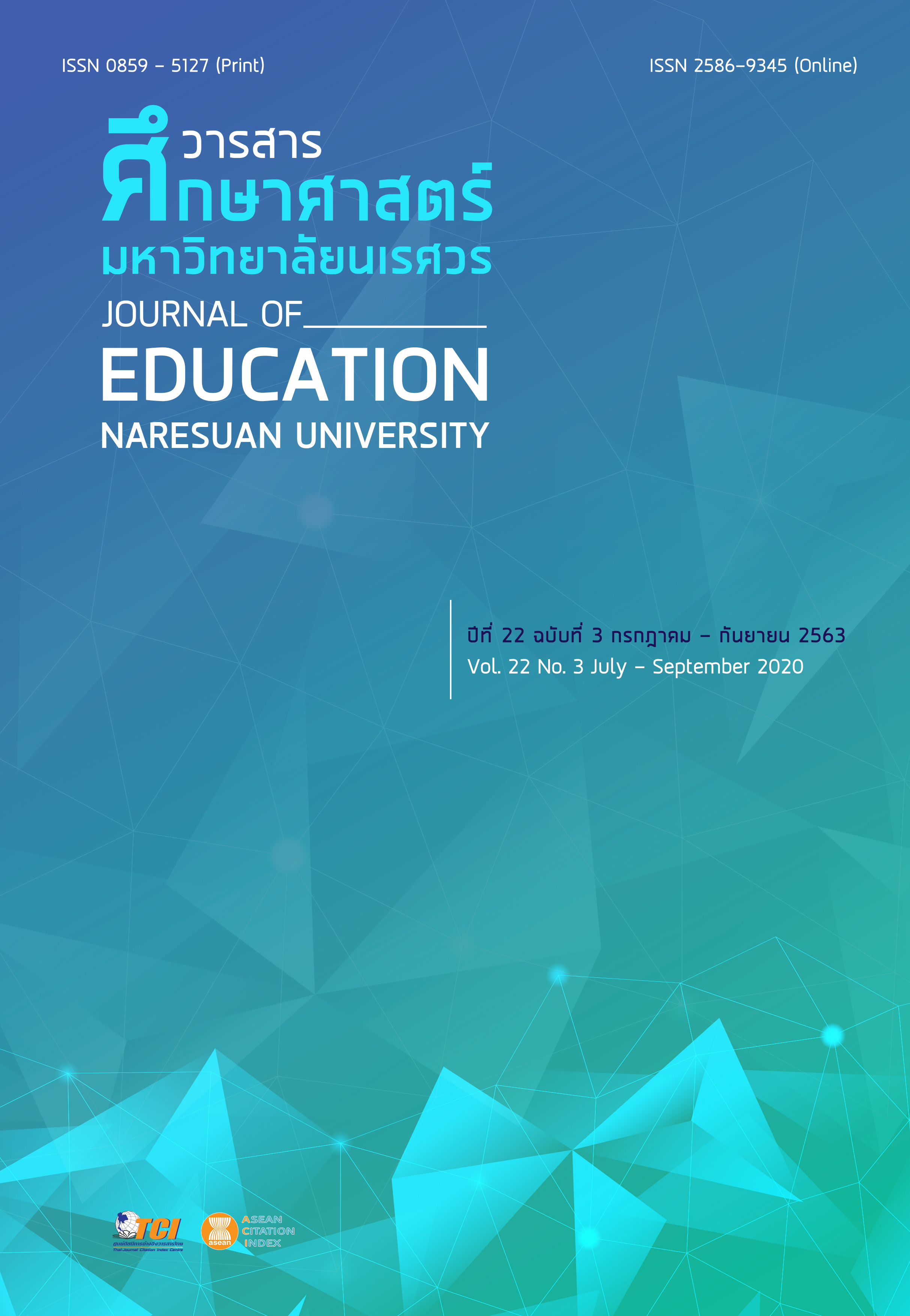THE DEVELOPMENT OF INSTRUCTIONAL SYSTEM OF COMMUNITY-BASED LEARNING IN LOCAL PRODUCT LOGISTICS TO ENCOURAGE LIFE SKILLS FOR HIGH SCHOOL STUDENT การพัฒนาระบบการเรียนการสอนแบบชุมชนเป็นฐานวิชาโลจิสติกส์ ของผลิตภัณฑ์ท้องถิ่นเพื่อเสริมสร้างทักษะชีวิต สำหรับนักเรียนระดับมัธยมศึกษาตอนปลาย
Main Article Content
Abstract
This is a research and development project. The purpose of this research were to the development of instructional systems of community-based learning in local product logistics to encourage life skills for high school students. The specific purpose of this research were 1) to create and find the quality of the development of instructional systems of community-based learning in local product logistics to encourage life skills for high school students, and 2) to study the effects of using the development of instructional systems of community-based learning in local product logistics to encourage life skills for high school students. The sample consisted of 21 high school students in local product logistics course at Sungmen-Chanupatham school with a purposive sampling in 13-week trial run. The research instruments include questionnaires, achievement test, life skill test, and satisfaction test. The data were analyzed using frequency, percentage, mean, standard deviation, and t-test dependent. The results of this research were as follows:
1. The effects of create and find the quality of the development of instructional systems of community-based learning in local product logistics to encourage life skills for high school students,
1.1 The purpose of this research were to the development of instructional systems of community-based learning in local product logistics to encourage life skills for high school students consisted of 7 component that were 1) principles, 2) objective, 3) content, 4) teacher role, 5) student role, 6) instruction process, and 7) assessment and 4 steps of instructional process are 1) preparation, 2) process, 3) productivity, and 4) reflection.
1.2 The specialists have agreed that the development of instructional systems of community-based learning in local product logistics to encourage life skills for high school students is highly appropriate and to be implemented as a part of logistic and supply chain curriculum in high school.
2. The effects of using the development of instructional systems of community-based learning in local product logistics to encourage life skills for high school students were:
2.1 Achievement in local product logistics course of students in instructional systems of community-based learning to encourage life skills for high school students had statistically higher problem solving ability at .05 significant level.
2.2 Life skills of students in instructional systems of community-based learning had statistically higher problem solving ability at .05 significant level and all student in Local Product Logistics course were behavior life skills assessment score was based on criteria in excellent level.
2.3 The level of student’s satisfaction using instructional systems of community-based learning to encourage life skills for high school students was at the highest score.
Article Details
The owner of the article does not copy or violate any of its copyright. If any copyright infringement occurs or prosecution, in any case, the Editorial Board is not involved in all the rights to the owner of the article to be performed.
References
Department of Mental Health. (2018). The survey of happiness and attitude of adolescents on Valentine's Day in 2018. Retrieved February 15, 2018. from https://www.dmh.go.th/news-dmh/view.asp?id=27571 [in Thai]
Gibbons, M., & Hopkins, D. (1986). How experiential is your experience-based program? In R. Kraft & M. Sakofs (Eds.), The theory of experiential education (pp. 135-140). Boulder, CO: Association for Experiential Education.
Ministry of Education. (2012). Life skills measurement and assessment tool. Retrieved December 17, 2014. from http://www.moe.go.th [in Thai]
Office of the Basic Education Commission. (2011). Enhancing "life skills" based on the focus on quality development primary – secondary school. Bangkok: The Agricultural Cooperative Federation of Thailand. [in Thai]
Owens, T. R., & Changhua, W. (1996). Community-based learning: A foundation for meaningful educational reform. Portland, OR: Northwest Regional Educational Laboratory.
Panich, V. (2013). Place-based learning. Retrieved February 20, 2015. from https://www.gotoknow.org/posts/565909 [in Thai]
School of Logistics and Supply Chain. (2014). Development of logistics and supply chain curriculum. Retrieved February 20, 2016. from http://learning.slsc.nu.ac.th/ [in Thai]
Sittiwong, T. (2015). Study on study-boosting environment by students of education communication technology program. Retrieved February 25, 2016. from http://nuir.lib.nu.ac.th/dspace/handle/123456789/566 [in Thai]
Sittiwong, T., & Wongnam, T. (2016). Studying of 5-STEP learning process (QSCCS) for master’s degree students in Educational Technology and Communications Program, Faculty of Education, Naresuan University. Journal of Education Naresuan University, 18(4), 86-98. [in Thai]
World Health Organization (WHO). (1994). Life skills education for children and adolescences in school. London: Education Department of Health.


